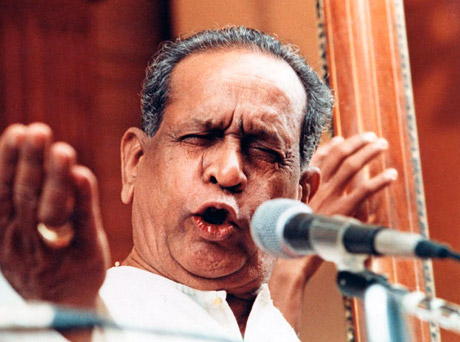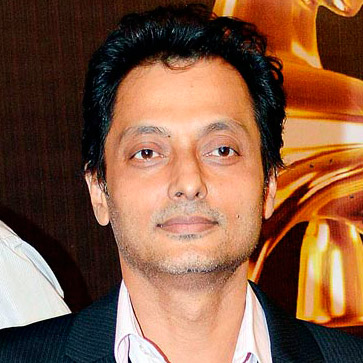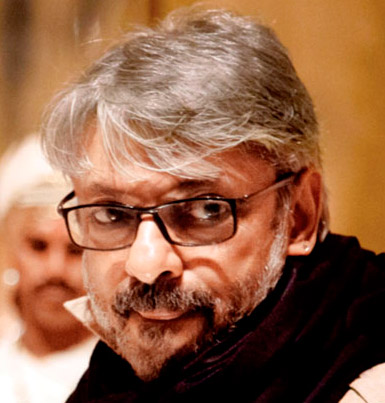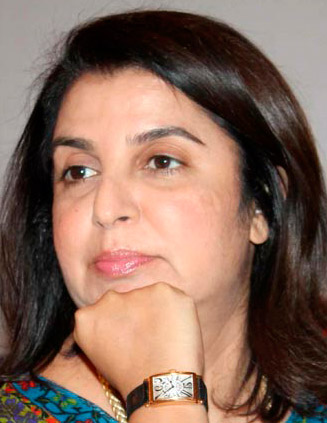Bollywood Masala Mix
Singing maestro extraordinaire Pt Bhimsen Joshi

Kirana gharana maestro Pandit Bhimsen Gururaj Joshi (February 4, 1922 - January 24, 2011) was born in Gadag, Karnataka. His father was a teacher whose contributions include a Kannada-English dictionary which is a standard reference work. He also authored 'Naadaputra', a short biography of Bhimsen, a rare example of a father writing about his son.
Panditji was a good student, but he loved music. It ultimately prompted him to run away from home when he was 11 and his quest for a good teacher took him to Bijapur, Gwalior, Kolkata, Delhi and Jalandhar before he came back home to become a disciple of Sawai Gandharva, the disciple of Ustad Abdul Karim Khan whom Panditji admired.
Bhimsen began to live at his guru's house and was taught nothing for the first 18 months, primarily because his student's voice was breaking and to test his sincerity. Bhimsen stayed with his teacher till 1940 and learnt raga Todi, Multani and Pooriya.
His meeting with vocalist Begum Akhtar fetched him a job as a staff artiste at Lucknow radio station where he became friends with shehnai player Ustad Bismillah Khan. In 1943, he moved to Mumbai, but his real break came in 1946 at a concert to mark the 60th birthday of Sawai Gandharva. His guru and the audience appreciated the performance.
Bhimsen started as a recording artiste in 1944 with HMV when the company released two Hindi and two devotional songs in Kannada. He recorded prolifically for the company and in 1984 became the first Hindustani vocalist to win a platinum disc.
The music wizard's performances were said to have been marked by naturalness, precise notes, dizzyingly-paced taans which make use of his outstanding voice training, and a mastery over beat. He was considered a purist and refrained from experimensal forms of music. Bhimsen Joshi lent his voice to several films, including Basant Bahar (1956) with Manna Dey, Birbal My Brother (1973) with Pandit Jasraj, and Kannada films like Sandhya Raaga and Nodi Swami Naavu Irodhu Heege. He also sang for the films Tansen (1958) and Ankahee (1985). The latter fetched him National Film Award for Best Male Playback Singer.
Bhimsen Joshi had a great passion for cars. He was an expert swimmer, a keen enthusiast of yoga and a football player in his younger days.
There are three documentaries on him. The first was in 1965 by M Louis, a Dutch film producer who was deeply intrigued by Panditji after hearing him. He came to India and made a film that was shown all over in the West. The second documentary, called Raga Miyan Malhar', was made by Canadian businessman James Beveridge. It portrays the maestro singing just raga Miyan Malhar.
The third is a conventional 45-minute documentary shot in 1993 by noted poet Gulzar which bagged the national award.
Panditji has sung on occasions of national importance. He, along with Lata Mangeshkar, performed at Parliament house on the 50th anniversary of India's independence.
There have been many awards; India's highest civilian award Bharat Ratna was conferred on him in 2008; Padma Shri in 1972; Padma Bhushan in 1985; and Padma Vibhushan in 1999. The Maharashtra government honoured him with the Maharashtra Bhushan in 2002. In between, he also received the Sangeet Natak Akademi award in 1975 and was made a fellow in 1998. The Madhya Pradesh government awarded him the Tansen Sanman award in 1992. The Karnataka Rathna presented to him in September 2005. His voice opened the short film on national integration 'Mile Sur Mera Tumhara' and the second film on Des raga also became equally popular.
Panditji was a good student, but he loved music. It ultimately prompted him to run away from home when he was 11 and his quest for a good teacher took him to Bijapur, Gwalior, Kolkata, Delhi and Jalandhar before he came back home to become a disciple of Sawai Gandharva, the disciple of Ustad Abdul Karim Khan whom Panditji admired.
Bhimsen began to live at his guru's house and was taught nothing for the first 18 months, primarily because his student's voice was breaking and to test his sincerity. Bhimsen stayed with his teacher till 1940 and learnt raga Todi, Multani and Pooriya.
His meeting with vocalist Begum Akhtar fetched him a job as a staff artiste at Lucknow radio station where he became friends with shehnai player Ustad Bismillah Khan. In 1943, he moved to Mumbai, but his real break came in 1946 at a concert to mark the 60th birthday of Sawai Gandharva. His guru and the audience appreciated the performance.
Bhimsen started as a recording artiste in 1944 with HMV when the company released two Hindi and two devotional songs in Kannada. He recorded prolifically for the company and in 1984 became the first Hindustani vocalist to win a platinum disc.
The music wizard's performances were said to have been marked by naturalness, precise notes, dizzyingly-paced taans which make use of his outstanding voice training, and a mastery over beat. He was considered a purist and refrained from experimensal forms of music. Bhimsen Joshi lent his voice to several films, including Basant Bahar (1956) with Manna Dey, Birbal My Brother (1973) with Pandit Jasraj, and Kannada films like Sandhya Raaga and Nodi Swami Naavu Irodhu Heege. He also sang for the films Tansen (1958) and Ankahee (1985). The latter fetched him National Film Award for Best Male Playback Singer.
Bhimsen Joshi had a great passion for cars. He was an expert swimmer, a keen enthusiast of yoga and a football player in his younger days.
There are three documentaries on him. The first was in 1965 by M Louis, a Dutch film producer who was deeply intrigued by Panditji after hearing him. He came to India and made a film that was shown all over in the West. The second documentary, called Raga Miyan Malhar', was made by Canadian businessman James Beveridge. It portrays the maestro singing just raga Miyan Malhar.
The third is a conventional 45-minute documentary shot in 1993 by noted poet Gulzar which bagged the national award.
Panditji has sung on occasions of national importance. He, along with Lata Mangeshkar, performed at Parliament house on the 50th anniversary of India's independence.
There have been many awards; India's highest civilian award Bharat Ratna was conferred on him in 2008; Padma Shri in 1972; Padma Bhushan in 1985; and Padma Vibhushan in 1999. The Maharashtra government honoured him with the Maharashtra Bhushan in 2002. In between, he also received the Sangeet Natak Akademi award in 1975 and was made a fellow in 1998. The Madhya Pradesh government awarded him the Tansen Sanman award in 1992. The Karnataka Rathna presented to him in September 2005. His voice opened the short film on national integration 'Mile Sur Mera Tumhara' and the second film on Des raga also became equally popular.

Bollywood director and screenwriter Sujoy Ghosh, whose 14-minute short film Ahalya created a stir on the internet, feels the increased usage of internet and smartphones has brought about the new wave of making short films.
Talking about the emergence of short films in India, Ghosh said the internet has provided the short filmmakers with a perfect platform which was not there earlier.
“At the moment, when we make a short film, the internet is our only medium. The number of short films has significantly increased now as there is a medium to put it up for viewing. Earlier, if you made a short film, where would you put it up except for limited screenings at those little-specialised film clubs?” Ghosh said at the Tata Steel Kolkata Literary Meet on Sunday.
The famed director of the 2012 hit film “Kahaani”, said the internet would continue to be the main medium for short films as going to multiplex for a 15-minute film “would not be economical”.
“For you to have a coffee and watch a short film in a multiplex, they would charge you a ticket and that ticket would not generally make sense for a 15-minute pleasure. So, the economics part of the matter would not make much sense,” he said.
Lauding the fact that the internet has no censorship, he said the short film makers should be given a certain amount of creative freedom to experiment so that it strikes the viewers within the short span.
Talking about the emergence of short films in India, Ghosh said the internet has provided the short filmmakers with a perfect platform which was not there earlier.
“At the moment, when we make a short film, the internet is our only medium. The number of short films has significantly increased now as there is a medium to put it up for viewing. Earlier, if you made a short film, where would you put it up except for limited screenings at those little-specialised film clubs?” Ghosh said at the Tata Steel Kolkata Literary Meet on Sunday.
The famed director of the 2012 hit film “Kahaani”, said the internet would continue to be the main medium for short films as going to multiplex for a 15-minute film “would not be economical”.
“For you to have a coffee and watch a short film in a multiplex, they would charge you a ticket and that ticket would not generally make sense for a 15-minute pleasure. So, the economics part of the matter would not make much sense,” he said.
Lauding the fact that the internet has no censorship, he said the short film makers should be given a certain amount of creative freedom to experiment so that it strikes the viewers within the short span.

Director Sanjay Leela Bhansali and his crew cancelled the shooting of "Padmavati" in Jaipur in the aftermath of the attack on him and vandalism on the sets of the movie by a Rajput group.
Bollywood celebrities are appalled at the manner in which Bhansali was attacked and have demanded stern action against the culprits.
Activists of a Rajput organisation, Shree Rajput Karni Sena, assaulted Bhansali, on Friday, slapped him and tore up his shirt.
Members of the Rajput community group stopped the shooting of the film by damaging the set at Jaigarh Fort, alleging that the director was "distorting facts" in the movie which is about Alauddin Khilji's obsession with Rani Padmavati.
Karni Sena on Saturday also reiterated its stand to oppose any distortion of historical facts and demanded a written assurance from the director while also blaming his security for Thursday's commotion.
Bollywood, including the film's three lead stars – Ranveer Singh, Deepika Padukone and Shahid Kapoor – has slammed the fringe outfit for the incident.
Deepika, who is in the titular role of Padmavati, tweeted, "In a state of shock!deeply saddened and disheartened by yesterday's events!#Padmavati."
Ranveer too termed it an "unfortunate" incident.
Shahid, who is in the role of Raja Ratan Singh, condemned the assault on Bhansali, saying violence is "unacceptable".
Terming the incident as "unacceptable", Film & Television Producers Guild of India Ltd and many leading members of the film fraternity like Salim Khan, Shabana Azmi, Karan Johar, Anurag Kashyap, Hansal Mehta, have urged the government to take strong punitive action against the group.
The protesters also misbehaved with the crew and criticised the famed director for "distorting" history. Bhansali was shooting some scenes of "Padmavati" in Jaigarh Fort when the attack was reported, the police said.
They damaged cameras and other equipment, forcing Bhansali to stop shooting.
As news of the attack broke, celebrities took to social media to express their anger and shock.
Ranveer Singh, Deepika Padukone and Shahid Kapoor starrer "Padmavati" tells the story of Alauddin Khilji, the medieval-era Delhi ruler, who fell in love with Rajput queen Padmavati.
Bollywood celebrities are appalled at the manner in which Bhansali was attacked and have demanded stern action against the culprits.
Activists of a Rajput organisation, Shree Rajput Karni Sena, assaulted Bhansali, on Friday, slapped him and tore up his shirt.
Members of the Rajput community group stopped the shooting of the film by damaging the set at Jaigarh Fort, alleging that the director was "distorting facts" in the movie which is about Alauddin Khilji's obsession with Rani Padmavati.
Karni Sena on Saturday also reiterated its stand to oppose any distortion of historical facts and demanded a written assurance from the director while also blaming his security for Thursday's commotion.
Bollywood, including the film's three lead stars – Ranveer Singh, Deepika Padukone and Shahid Kapoor – has slammed the fringe outfit for the incident.
Deepika, who is in the titular role of Padmavati, tweeted, "In a state of shock!deeply saddened and disheartened by yesterday's events!#Padmavati."
Ranveer too termed it an "unfortunate" incident.
Shahid, who is in the role of Raja Ratan Singh, condemned the assault on Bhansali, saying violence is "unacceptable".
Terming the incident as "unacceptable", Film & Television Producers Guild of India Ltd and many leading members of the film fraternity like Salim Khan, Shabana Azmi, Karan Johar, Anurag Kashyap, Hansal Mehta, have urged the government to take strong punitive action against the group.
The protesters also misbehaved with the crew and criticised the famed director for "distorting" history. Bhansali was shooting some scenes of "Padmavati" in Jaigarh Fort when the attack was reported, the police said.
They damaged cameras and other equipment, forcing Bhansali to stop shooting.
As news of the attack broke, celebrities took to social media to express their anger and shock.
Ranveer Singh, Deepika Padukone and Shahid Kapoor starrer "Padmavati" tells the story of Alauddin Khilji, the medieval-era Delhi ruler, who fell in love with Rajput queen Padmavati.

Ace director and choreographer Farah Khan is known to speak her mind. This time the lady has voiced her opinion on people who deride Bollywood films.
Expressing her displeasure, Farah said, "This will be a constant factor... These people should be made to watch French or Polish cinema. Their punishment should be that they should be made to watch boring films for their whole life."
Expressing her displeasure, Farah said, "This will be a constant factor... These people should be made to watch French or Polish cinema. Their punishment should be that they should be made to watch boring films for their whole life."
A special committee will begin the process of issuing no objection certificates to allow screening of Indian movies in Pakistan, minister of state for information Marriyum Aurangzeb said.
The clearance to foreign content will be given pertaining to commerce ministry's new import order. The committee was formed by Prime Minister Nawaz Sharif.
"Importing the foreign content will be planned and the content will be shared with the censor board and passed through other procedure," the Dawn quoted Marriyum as saying.
Marriyum said that the process is expected to take some time. The certificates cannot be issued without the consent and endorsement of the commerce ministry, she added.
Meanwhile, the commerce minister in an official statement said that the government has decided to maintain the present policy regarding the import of Indian films after reviewing the benefits Pakistani cinema trade can derive from their exhibition, ANI reported.
"The close examination of historical and empirical data including the trends of the industry since 1965 till date, it is evident that, the inclusion of all foreign content, including Indian film content in local cinemas, has a multiplier impact on the commerce and development of the Pakistani film trade and industry as a whole," she said, adding the panel also reviewed investment plans of the local film industry.
Film Exhibitors Association of Pakistan imposed the ban on screenings last October after tensions escalated between the two countries following ceasefire violations across the Line of Control.
The clearance to foreign content will be given pertaining to commerce ministry's new import order. The committee was formed by Prime Minister Nawaz Sharif.
"Importing the foreign content will be planned and the content will be shared with the censor board and passed through other procedure," the Dawn quoted Marriyum as saying.
Marriyum said that the process is expected to take some time. The certificates cannot be issued without the consent and endorsement of the commerce ministry, she added.
Meanwhile, the commerce minister in an official statement said that the government has decided to maintain the present policy regarding the import of Indian films after reviewing the benefits Pakistani cinema trade can derive from their exhibition, ANI reported.
"The close examination of historical and empirical data including the trends of the industry since 1965 till date, it is evident that, the inclusion of all foreign content, including Indian film content in local cinemas, has a multiplier impact on the commerce and development of the Pakistani film trade and industry as a whole," she said, adding the panel also reviewed investment plans of the local film industry.
Film Exhibitors Association of Pakistan imposed the ban on screenings last October after tensions escalated between the two countries following ceasefire violations across the Line of Control.